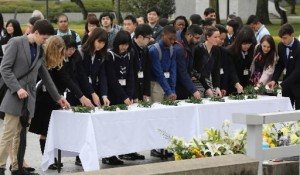Students from G7 nations hold meeting of “youth foreign ministers” in Hiroshima
Apr. 1, 2016
by Masanori Wada, Staff Writer
On March 19, ahead of the meeting of G7 foreign ministers to be held in Hiroshima in April, the “G7 Youth Foreign Ministers’ Meeting in Hiroshima,” with junior high school and high school students from seven nations, opened at the International Conference Center Hiroshima in Naka Ward. Twenty-four participants from Japan and overseas are exchanging views on nuclear disarmament and other issues. On March 20, the participants’ “Hiroshima Declaration” will then be presented as a peace message from Hiroshima.
The participants are students, ages 15 to 18, from Japan and these six nations: the United States, the United Kingdom, France, Germany, Italy, and Canada. At the welcome ceremony, Hiroshima Governor Hidehiko Yuzaki stressed the importance of young people playing an active role in advancing the abolition of nuclear weapons. Hiroshima Mayor Kazumi Matsui also expressed encouragement, saying, “I believe your meeting will help pave the way for a successful outcome of the meeting of G7 foreign ministers in April.”
Later in the day, the participants visited the Hiroshima Peace Memorial Museum, guided by local high school students, and observed the personal effects of A-bomb victims, including a charred lunch box. They also offered flowers at the Cenotaph for the A-bomb Victims, and listened to the account of Masahiro Kunishige, 84, an A-bomb survivor and resident of Saiki Ward.
The meeting has been organized by the council promoting the meeting of G7 foreign ministers, which consists of 18 public and private groups, including Hiroshima Prefecture and Hiroshima City. At the meeting, discussions will focus on the main theme titled “Towards a Peaceful World: What We Can Do.” The gathering will last until March 21. On the final day, other events, like a cultural exchange program, will take place.
Alvin Watts, 16, a high school student serving as a U.S. representative, said that he didn’t think nuclear weapons were necessary, and that there were many things about the history of the atomic bombing that he hadn’t known. He added that he wanted to learn about the importance of a peaceful world while in Hiroshima.
(Originally published on March 20, 2016)
On March 19, ahead of the meeting of G7 foreign ministers to be held in Hiroshima in April, the “G7 Youth Foreign Ministers’ Meeting in Hiroshima,” with junior high school and high school students from seven nations, opened at the International Conference Center Hiroshima in Naka Ward. Twenty-four participants from Japan and overseas are exchanging views on nuclear disarmament and other issues. On March 20, the participants’ “Hiroshima Declaration” will then be presented as a peace message from Hiroshima.
The participants are students, ages 15 to 18, from Japan and these six nations: the United States, the United Kingdom, France, Germany, Italy, and Canada. At the welcome ceremony, Hiroshima Governor Hidehiko Yuzaki stressed the importance of young people playing an active role in advancing the abolition of nuclear weapons. Hiroshima Mayor Kazumi Matsui also expressed encouragement, saying, “I believe your meeting will help pave the way for a successful outcome of the meeting of G7 foreign ministers in April.”
Later in the day, the participants visited the Hiroshima Peace Memorial Museum, guided by local high school students, and observed the personal effects of A-bomb victims, including a charred lunch box. They also offered flowers at the Cenotaph for the A-bomb Victims, and listened to the account of Masahiro Kunishige, 84, an A-bomb survivor and resident of Saiki Ward.
The meeting has been organized by the council promoting the meeting of G7 foreign ministers, which consists of 18 public and private groups, including Hiroshima Prefecture and Hiroshima City. At the meeting, discussions will focus on the main theme titled “Towards a Peaceful World: What We Can Do.” The gathering will last until March 21. On the final day, other events, like a cultural exchange program, will take place.
Alvin Watts, 16, a high school student serving as a U.S. representative, said that he didn’t think nuclear weapons were necessary, and that there were many things about the history of the atomic bombing that he hadn’t known. He added that he wanted to learn about the importance of a peaceful world while in Hiroshima.
(Originally published on March 20, 2016)








